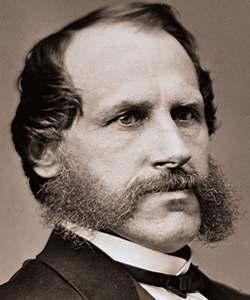George Henry Williams (Congressional Biographical Directory)
Reference
WILLIAMS, George Henry, a Senator from Oregon; born in New Lebanon, Columbia County, N.Y., March 26, 1823; completed preparatory studies; studied law; admitted to the bar in 1844 and commenced practice at Fort Madison, Iowa Territory; judge of the first judicial district of Iowa 1847-1852; presidential elector on the Democratic ticket in 1852; chief justice of the Territory of Oregon 1853-1857; reappointed by President James Buchanan but declined; member of the State constitutional convention of Oregon in 1858; elected as a Republican to the United States Senate and served from March 4, 1865, to March 3, 1871; unsuccessful candidate for reelection; Attorney General of the United States in the Cabinet of President Ulysses Grant 1872-1875; nominated by President Grant as Chief Justice of the Supreme Court of the United States in 1873, but subsequently his name was withdrawn; mayor of Portland, Oreg., 1902-1905; died in Portland, Oreg., April 4, 1910; interment in Riverview Cemetery.
"Williams, George Henry," Biographical Directory of the United States Congress, 1774 to Present, http://bioguide.congress.gov/scripts/biodisplay.pl?index=W000498.
George Henry Williams, Slavery (American National Biography)
Scholarship
In 1853, upon the recommendation of Senator Stephen A. Douglas of Illinois, President [Franklin] Pierce appointed Williams chief justice of the territorial courts of Oregon, where Williams remained until 1857. One of his controversial decisions involved a free African American, Robin Holmes, who had sued his former owner, Nathaniel Ford, to obtain legal custody of his children. Williams, who opposed the extension of slavery into Oregon, ruled in favor of Holmes.
Although reappointed chief justice of the territory of Oregon by President James Buchanan, Williams resigned in 1857 to practice law in Portland, Oregon. While building his practice, he, in partnerships, formed a woolen manufacturing company, acquired the Oregon Statesman, and established the Oregon Printing and Publishing Company…. In 1857 Williams published his "Free State Letter" in the Oregon Statesman, contending that, from a practical standpoint, slavery in Oregon should be prohibited. This letter antagonized many of his proslavery Democratic friends. That same year he participated in the Oregon constitutional convention, and because of his judicial background, he was selected to chair the committee dealing with the judicial branch of government. Oregon entered the Union in 1859.
Although reappointed chief justice of the territory of Oregon by President James Buchanan, Williams resigned in 1857 to practice law in Portland, Oregon. While building his practice, he, in partnerships, formed a woolen manufacturing company, acquired the Oregon Statesman, and established the Oregon Printing and Publishing Company…. In 1857 Williams published his "Free State Letter" in the Oregon Statesman, contending that, from a practical standpoint, slavery in Oregon should be prohibited. This letter antagonized many of his proslavery Democratic friends. That same year he participated in the Oregon constitutional convention, and because of his judicial background, he was selected to chair the committee dealing with the judicial branch of government. Oregon entered the Union in 1859.
Leonard Schlup, "Williams, George Henry," American National Biography Online, February 2000, http://www.anb.org/articles/05/05-00959.html.
George Henry Williams, Radical Republican (American National Biography)
Scholarship
Becoming increasingly dissatisfied with the Democratic party during the course of the Civil War and pleased with the policies of President Abraham Lincoln, Williams joined the Republican party in 1864. That year the Oregon state legislature elected him as a Republican to the U.S. Senate, where he served from 1865 to 1871.... Williams supported the Radical Republicans, including Representative Thaddeus Stevens of Pennsylvania, in attempts to impose a strict policy of Reconstruction on the vanquished South. He wrote the Reconstruction Act of 1867, which reorganized the Confederate states under military governors. His position on Reconstruction was further refined in a Senate speech on 4 February 1868. A member of the Joint Committee on Reconstruction and of the Senate Committee on the Judiciary, he opposed President Andrew Johnson. Williams introduced the Tenure of Office Act of 1867 to prohibit the chief executive from removing cabinet members and other civil officials without senatorial approval, fearing that the southern president might replace loyal Republicans appointed by Lincoln with former rebels. Congress passed this controversial measure over Johnson's veto. In 1868 Williams was one of the chief advocates of the impeachment of Johnson.
Leonard Schlup, "Williams, George Henry," American National Biography Online, February 2000, http://www.anb.org/articles/05/05-00959.html.



